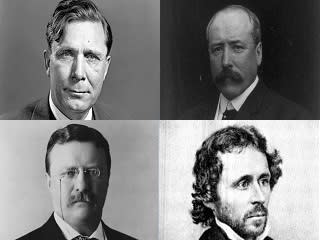Few historical precedents for Trump as major party nominee
Donald Trump’s big win in Indiana all but assures his GOP nomination in July. But has there ever been a major party nominee with his outsider status?
To be sure, there have been candidates who’ve never had experience in elected or appointed government, and they have appeared on the fall presidential ballot. But almost all had some public service experience, either in the military or the judicial system. For example, Andrew Jackson was perceived as an outsider in 1824, but he also served in the House and Senate by that point of his career, in addition to various military roles.
Trump, 69, has an extensive business background and he also is a prominent celebrity who leveraged that exposure in the entertainment industry. And there were presidential candidates who made private fortunes and one who was a popular entertainment industry figure.
But there doesn’t appear to be one clear precedent for Trump, the candidate. Here are five nominees who share some background with the presumptive GOP nominee.
1. Wendell Willkie
Businessman Wendell Willkie is often cited as the one candidate closest to Trump in the area of not having any experience in public service before his presidential nomination. He managed to gain the Republican presidential nomination in 1940 at the GOP convention in Philadelphia by leveraging his popularity as a celebrity and general anger at the Democrats. Willkie was a corporate lawyer and president of a utilities company who started criticizing the Roosevelt administration and the New Deal in a series of public appearances. But in terms of wealth, Willkie left an estimated estate of $850,000 on his death in 1944, which is approximately $11.5 million in current dollars. In the end, Roosevelt easily defeated Willkie in the 1940 general election.
2. Alton Parker
Parker was chief judge of the state appeals court New York who managed to win the 1904 Democratic nomination for President. On the surface, that would appear to be his only public service position prior to his nomination. But Parker had been involved in state politics at an early age as the protégée and campaign manager of David Hill, a New York governor and a U.S. Senator. Parker also frequently refused to run for public office, earning the nickname “the Great Decliner.” When Parker did answer the call in 1904, he was trounced by another Roosevelt, Theodore.
3. John Frémont
Frémont had a brief six-month term in the U.S. Senate before his acclamation as the first Republican presidential nominee in 1856. But Americans had come to know Fremont from his celebrity as the “Great Pathfinder” of the west. His exploits were regular press fodder. He was a surveyor and the son-in-law of Senator Thomas Hart Benton; Frémont led five expeditions to map and chart the western United States. He also for a time accumulated a fortune during the California Gold Rush. By 1856, Frémont had survived scandals, including a military court-martial, to become the GOP nominee at the age of 43. The new party’s leaders convinced Frémont to leave the Democrats since the southern-born candidate was against slavery. In the general election, James Buchanan defeated Frémont, but the Republicans were within striking distance of taking the next general election. But Frémont’s national political career ended after a failed 1864 presidential bid.
4. Herbert Hoover
Hoover had served in two appointed public positions before securing the 1928 Republican nomination, but he also had secured considerable wealth and celebrity before his first political campaign. Hoover was worth an estimated $75 million in his lifetime due to his success as an engineer and a businessman at an early age. Hoover used his considerable organizational skills to lead the effort to organize supplies for the American war effort in Europe. But Hoover also served in the Harding and Coolidge administrations as Commerce Secretary, adding to his fame as “the Boy Wonder” and “the Great Humanitarian.” Hoover defeated Al Smith by a wide margin in the 1928 general election. But the onset of the Great Depression dominated his four years in the White House.
5. Theodore Roosevelt
At first glance, Roosevelt wouldn’t seem to have that much in common with Trump. But back in 1900, Roosevelt was popular, wealthy and seen as a political outsider and a populist. Roosevelt was a New Yorker at heart, and he inherited wealth. Roosevelt had pursued a career in public service and not private business. But Roosevelt also was controversial and always had people talking. The GOP didn’t renominate Roosevelt after he served one term in the state assembly in the 1880s. His experience as governor was limited to about 18 months before his nomination as Vice President; during that period, Roosevelt held daily press conferences to promote himself and his agenda. Republican leaders had Roosevelt named as Vice President to literally remove him from the New York political scene. After assuming the presidency after William McKinley’s death in 1901, Roosevelt stood for election as president in two campaigns. In 1904, he easily defeated Parker. The disastrous 1912 campaign saw Roosevelt battle William Howard Taft for the GOP nomination, with Roosevelt dividing the Republican Party after a bitter convention loss.
In the Outsider category, there were numerous other candidates with military backgrounds who ran for President and often won, including Jackson, Dwight Eisenhower, Ulysses S. Grant, Zachary Taylor, William Henry Harrison, and, of course, George Washington. Presidents who had limited public service backgrounds include Grover Cleveland and Woodrow Wilson. But Willkie would be the closest equivalent to Trump in the area of elected or chosen public service experience.
Historical Stories on Constitution Daily
Forgotten facts about George Washington’s private life
10 facts about Presidents who were also Veterans


